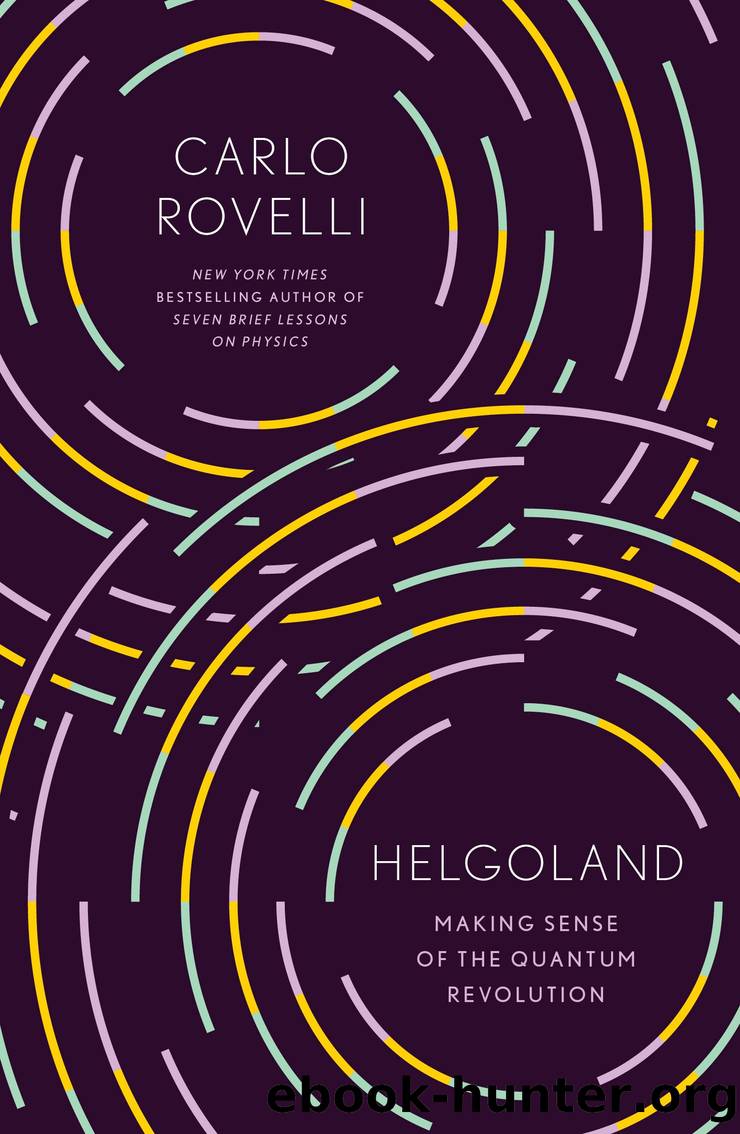Helgoland by Rovelli Carlo Carnell Simon Segre Erica

Author:Rovelli, Carlo, Carnell, Simon, Segre, Erica [Rovelli, Carlo]
Language: eng
Format: epub
Publisher: Penguin Publishing Group
Published: 2021-05-25T00:00:00+00:00
* * *
Lenin accuses Bogdanov and Mach of being âidealists.â An idealist, for Lenin, negates the existence of a real world beyond the spirit and reduces reality to the content of the mind.
If only âsensationsâ are real, argues Lenin, then external reality is assumed not to exist: we live in a solipsistic world where there is only myself and my sensations. I take myself, the subject, as the only reality. This idealism, for Lenin, is the ideological manifestation of the enemy: it is pure bourgeois-ism. Against idealism, Lenin poses a materialism that sees the human beingâhuman consciousness, human spiritâas an aspect of a concrete world that is objective, knowable, and comprising solely matter in motion in space.
Whatever we think about communism, there is no denying that Lenin was an extraordinary politician. His knowledge of philosophy is also impressive; if today we elected politicians as cultivated as Lenin, perhaps they would be more effective. But Lenin was no great philosopher. The influence of his philosophical writings is due more to his long dominance of the political scene, and his elevation to heroic status under Stalin, than to the profundity of his arguments. Mach deserves better.90
Bogdanov, indeed, replies to Lenin that his criticism misses the point. Machâs thought is not idealism, much less solipsism. The humanity that knows is not an isolated, transcendent subject; it is not the philosophical âIâ of idealism: it is real humanity, immersed in concrete history, part of the natural world. The âsensationsâ are not âwithin our mind.â They are natural phenomena in the world: the form in which the world presents itself to the world. They do not come to a self that is separate from the world: they come to the skin, to the brain, to the neurons of the retina, to the receptors in our ears. These are elements of nature.
Lenin defines âmaterialismâ in his book as the belief that a world exists beyond our minds.91 If this is the definition of materialism, then Mach is definitely a materialist; we are all materialists. Even the pope is a materialist. But then, for Lenin, the only acceptable version of materialism is the idea that âthere is nothing in the world except matter in motion in space and in time,â and that we can arrive at âabsolute truthsâ through knowledge of matter. Bogdanov highlights the scientific as much as the historical weakness of these peremptory assertions. Of course the world is outside our mind, but things are much more subtle than naive materialism would have it. The choice is not just between the idea that the world exists only in our minds and the idea that it consists only of particles of matter in motion.
Mach does not think, of course, that there is nothing outside our mind. On the contrary, he is interested precisely in what is outside our minds (whatever the âmindâ is): nature, in all its complexity, of which we are a part. Nature presents itself as a set of phenomena, and Mach recommends the
Download
This site does not store any files on its server. We only index and link to content provided by other sites. Please contact the content providers to delete copyright contents if any and email us, we'll remove relevant links or contents immediately.
The Complete Stick Figure Physics Tutorials by Allen Sarah(6631)
Secrets of Antigravity Propulsion: Tesla, UFOs, and Classified Aerospace Technology by Ph.D. Paul A. Laviolette(3430)
Thing Explainer by Randall Munroe(3318)
The River of Consciousness by Oliver Sacks(2988)
The Order of Time by Carlo Rovelli(2708)
I Live in the Future & Here's How It Works by Nick Bilton(2520)
A Brief History of Time by Stephen Hawking(2470)
How To by Randall Munroe(2464)
The Great Unknown by Marcus du Sautoy(2179)
What If?: Serious Scientific Answers to Absurd Hypothetical Questions by Randall Munroe(2166)
Blockchain: Ultimate Step By Step Guide To Understanding Blockchain Technology, Bitcoin Creation, and the future of Money (Novice to Expert) by Keizer Söze(2134)
Midnight in Chernobyl by Adam Higginbotham(2075)
Networks: An Introduction by Newman Mark(1994)
The Meaning of it All by Richard Feynman(1905)
Easy Electronics by Charles Platt(1859)
The Tao of Physics by Fritjof Capra(1841)
When by Daniel H Pink(1771)
Midnight in Chernobyl: The Untold Story of the World's Greatest Nuclear Disaster by Adam Higginbotham(1770)
Introducing Relativity by Bruce Bassett(1751)
